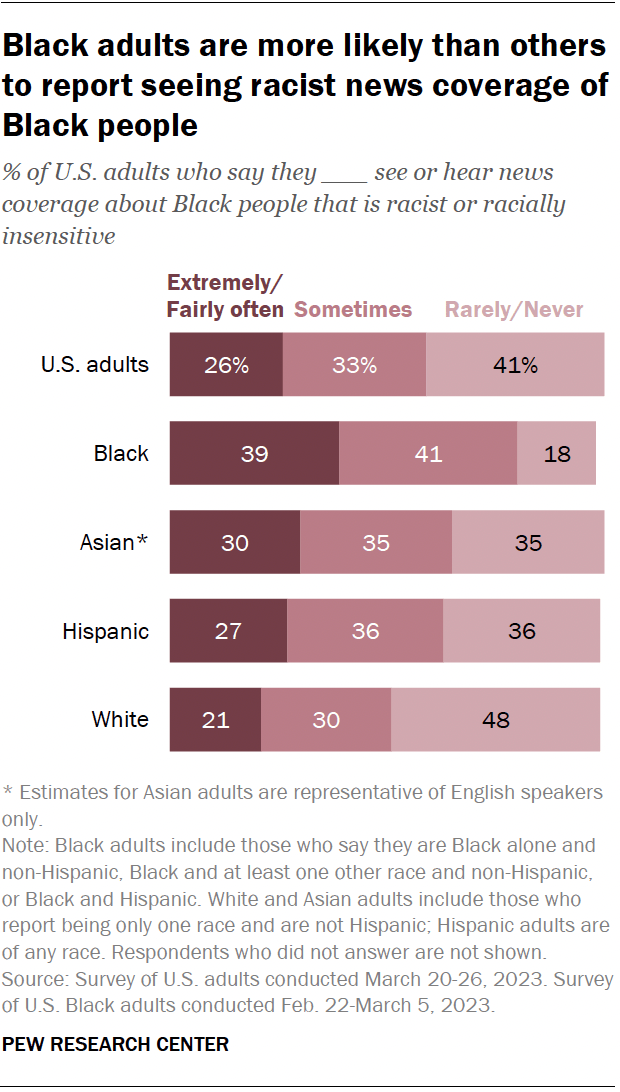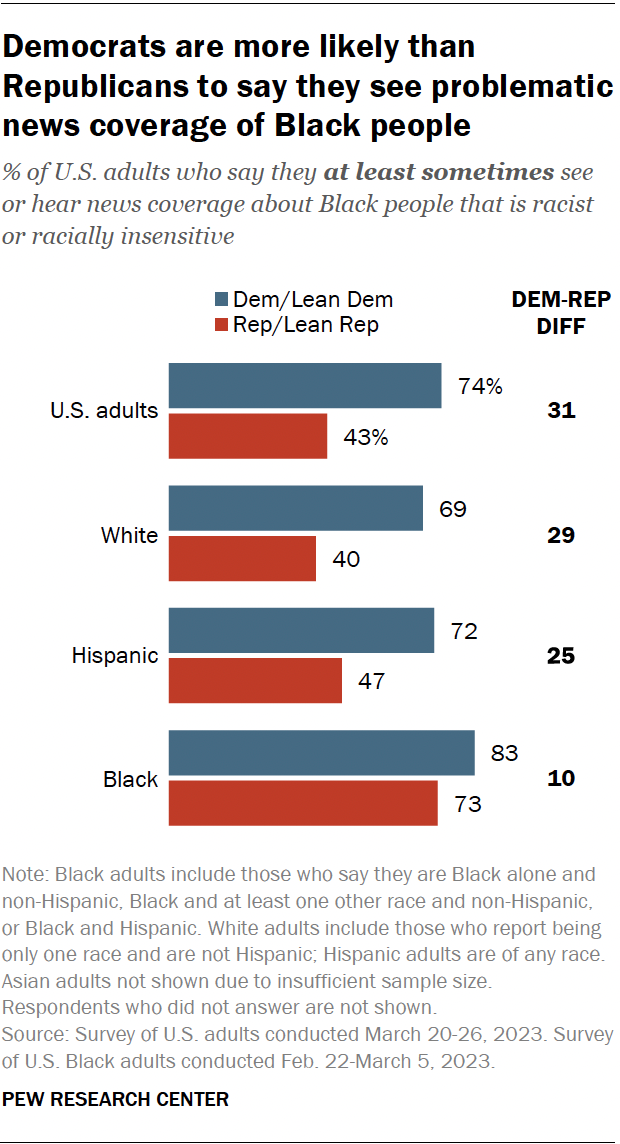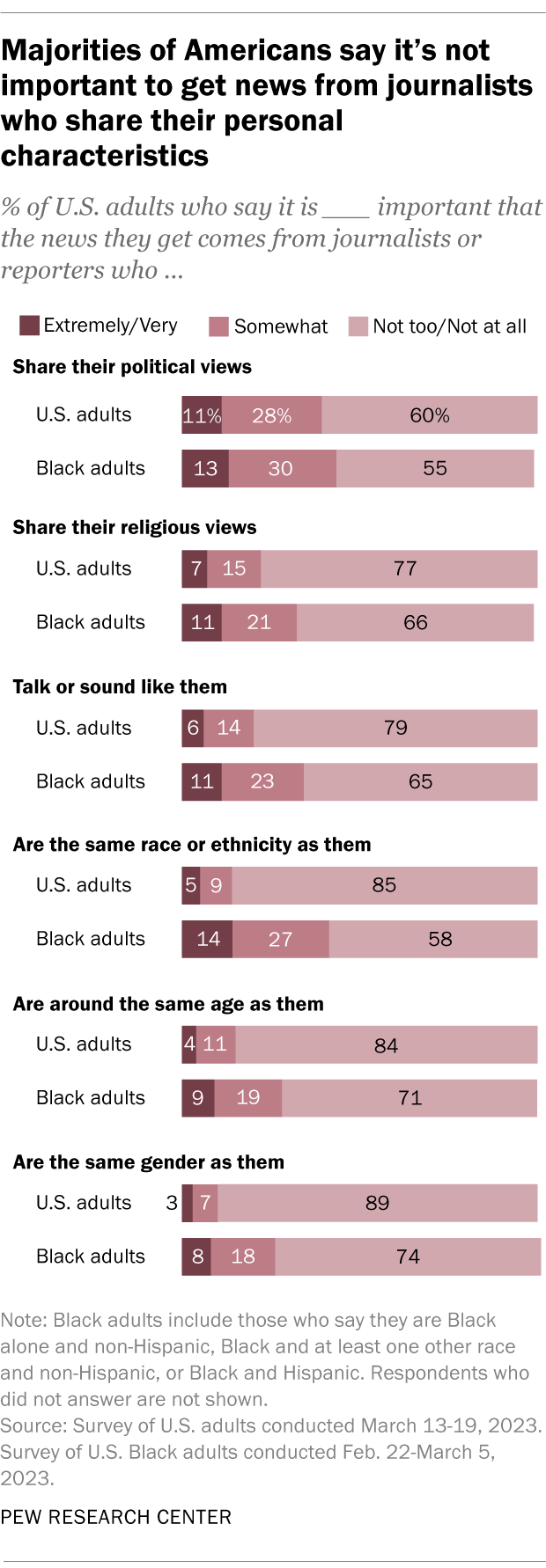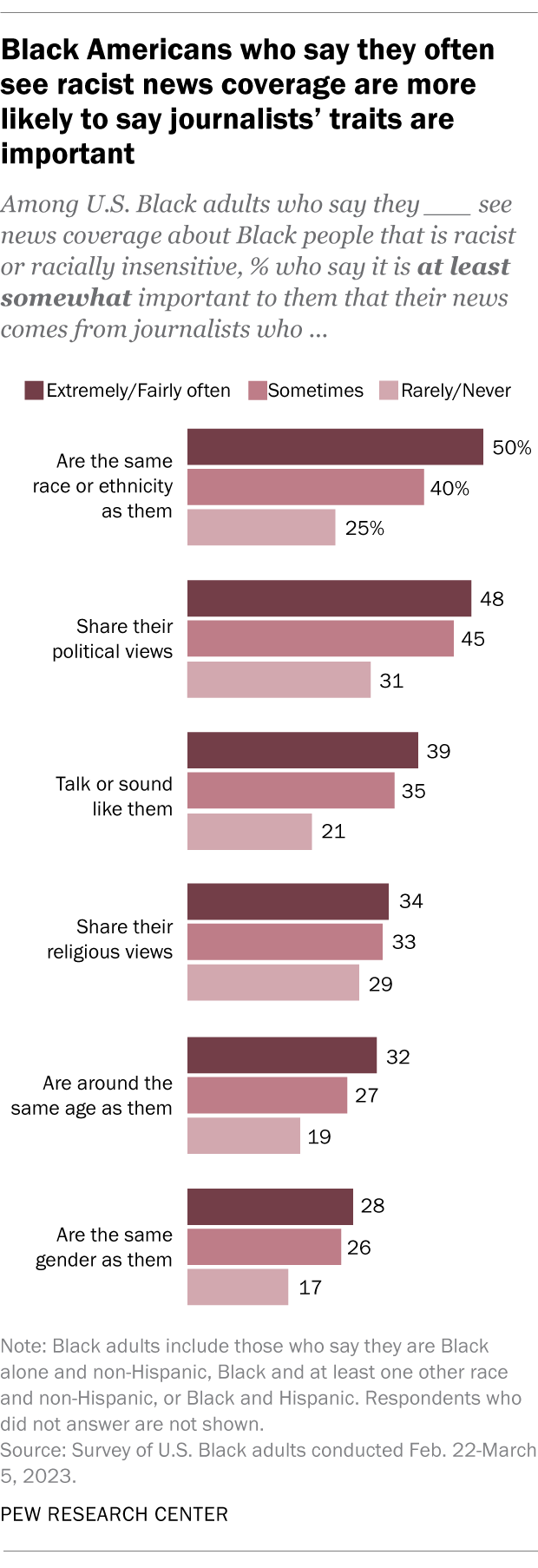Black Americans see several problems with how the news media covers Black people, according to a 2023 Pew Research Center survey on Black Americans’ experiences with news. For example, about four-in-ten Black Americans (39%) say they extremely or fairly often see or hear news coverage about Black people that is racist or racially insensitive. A similar share (41%) say they sometimes see this kind of coverage.
Pew Research Center conducted this analysis as part of a broader study of Black Americans’ experiences, habits and attitudes around news and information. The main source of data on Black Americans is a Center survey of 4,742 U.S. adults who identify as Black, conducted online from Feb. 22 to March 5, 2023. Black adults include those who say they are Black alone and non-Hispanic, Black and at least one other race and non-Hispanic, or Black and Hispanic.
The sample of Black Americans included 1,745 respondents from Pew Research Center’s American Trends Panel (ATP) and an additional 2,997 respondents from Ipsos’ KnowledgePanel (KP). The ATP and KP are both online survey panels recruited through national, random sampling of residential addresses. This way nearly all U.S. adults have a chance of selection.
This survey was administered only to adults who identified as Black and was weighted to be representative of the U.S. Black adult population by gender, age, ethnicity, partisan affiliation, education and other categories.
Here are the questions used for this survey, along with responses, and its methodology.
To compare our data on Black Americans’ experiences with news and information to those of larger sections of the American public and other racial and ethnic groups, we also used data from two ATP surveys. The first was conducted from March 13 to 19, 2023, and included 10,701 U.S. adults; the second was conducted from March 20 to 26, 2023, among 3,576 U.S. adults.
Here are the questions used for these surveys, along with responses, as well as the methodologies for the March 13-19 survey and the March 20-26 survey.
Pew Research Center is a subsidiary of The Pew Charitable Trusts, its primary funder. This is the latest analysis in Pew Research Center’s ongoing investigation of the state of news, information and journalism in the digital age, a research program funded by The Pew Charitable Trusts, with generous support from the John S. and James L. Knight Foundation.

But other racial and ethnic groups are less likely to say they often see racially problematic coverage of Black people, according to a separate Center survey of U.S. adults.
Among White Americans, 21% report seeing this kind of coverage extremely or fairly often, while an additional 30% see it sometimes. And about three-in-ten Asian (30%) and Hispanic (27%) adults say they often see racist coverage of Black people.
The combined share of respondents who see this kind of coverage at least sometimes is nearly 30 percentage points higher for Black respondents than for White respondents (80% vs. 51%). Asian (65%) and Hispanic (63%) respondents fall in the middle, lower than the share among Black adults but higher than that of White adults.

There are also political differences on this question: Among U.S. adults overall, Democrats and independents who lean Democratic are more likely than Republicans and GOP leaners to say they see or hear racist or racially insensitive news coverage about Black people. About three-quarters of Democrats (74%) say they see or hear this kind of coverage at least sometimes, compared with 43% of Republicans.
This partisan divide appears within racial and ethnic groups as well. White and Hispanic Democrats are much more likely than their Republican counterparts to say they at least sometimes see this kind of coverage. Black Democrats are also more likely than Black Republicans to say this, but the gap is much smaller. Majorities of Black adults in both parties say they see racist or racially insensitive coverage at least sometimes. (There were not enough Asian adults in our sample to look at their views by political party.)
Do people want their news providers to share their politics, race or other traits?

Majorities of Americans across racial and ethnic groups say it’s not important that the news they get comes from journalists or reporters who share their political opinions, religious views or demographic traits. For example, 60% of U.S. adults say it is not too or not at all important that the journalists they get news from share their political views. Only 11% say this is extremely or very important, while 28% say it is somewhat important.
Even smaller shares of Americans say it’s highly important that journalists:
- Share their religious views (7%)
- Talk or sound like them (6%)
- Are the same race or ethnicity as them (5%)
- Are around their age (4%)
- Are the same gender as them (3%)
However, on almost all of these traits, Black Americans are more likely than other groups to want their news to come from journalists who are similar to them. For instance, 41% of Black adults say it’s at least somewhat important that they get news from journalists of the same race or ethnicity as them. That compares with just 5% of White Americans, 20% of Asian Americans and 25% of Hispanic Americans. The only exception is sharing political views, where Black Americans are on par with other groups. (Read the Appendix for more in-depth data on how different racial and ethnic groups answered these questions.)
Still, a majority of Black Americans (58%) say it’s not too or not at all important that they get news from Black journalists. Instead, Black Americans mention several other factors as at least somewhat important in deciding whether a news story is trustworthy, such as the sources cited in the story and whether it is reported by multiple outlets.

Among Black Americans, those who say they often see racist or racially insensitive news about Black people are more likely to say it’s important that journalists have various characteristics in common with them. In other words, Black Americans who say they see racially problematic coverage are more likely to care about the attributes of the journalists who are producing their news.
For example, half of Black Americans who often see racially problematic news say it’s at least somewhat important that the news they get comes from journalists who share their race or ethnicity. This view is shared by only a quarter of those who say they rarely or never see racist news.
Note: Here are the questions used for these surveys, along with responses, as well as the methodologies for the March 13-19 survey and the March 20-26 survey.
